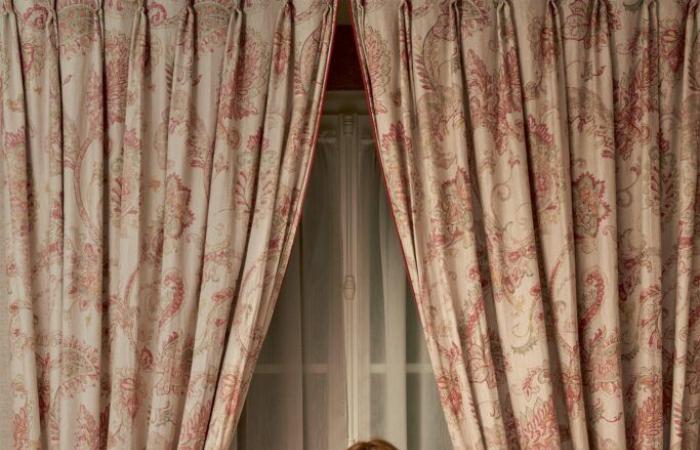The dream of every actor: to be popular and elitist. The interpreter of “Patriots” (1993), by Éric Rochant, and “Chronique d’une liaison passagère” (2022), by Emmanuel Mouret, retains the same capital of sympathy with the French, throughout his choices artistic. Sandrine Kiberlain today carries on her shoulders the role of the legendary actress Sarah Bernhardt (1844-1923). Between them, a fascinating play of mirrors. At this chic hotel, she arrives on time and orders tea. Long natural and warm silhouette. The actress opens a small jar of honey and realizes that it is all gooey. She wipes her fingers and makes no comment. Sandrine Kiberlain has succeeded in imposing her uniqueness on everyone. Sometimes serious, sometimes cheerful. She is a light crossed by shadows.
Paris Match. A simple laugh and we understand Sarah Bernhardt: her vitality, her cruelty, her freedom. How did you find this laugh?
Sandrine Kiberlain. It’s the difference between an imaginary character and a real person. The extravagant Sarah Bernhardt existed. We know a lot about her. Through this laughter, I put everything I felt about her: her insolence, her speed, her recklessness, her violence. His laughter came to me, one day, spontaneously. Sarah Bernhardt is passionate. She goes through with her feelings. She is not following the rules of decorum. “The Divine” focuses on several periods of her life, such as the day of her consecration, in 1896, and the amputation of her leg, in 1915, at age 70. Laughter unites them all and, as often, it betrays the unsaid: its wounds, its origins. I am attached to the voices and bodies of my characters.
Is being an actor work?
We all have a different conception of our job. Being an actress requires a mixture of instinct, imagination and work. The main thing is to learn the text. I want to know it in an atonal way, to the word, in order to make it completely mine. In “La Divine”, we find Sarah Bernhardt’s own flashes. It was necessary to make obvious turns of phrase that we no longer use today. We love in the same way throughout the centuries, but we do not express it in the same way. Sarah Bernhardt was extremely modern and unique. In the acting profession, there is a lot of play and work. When I find myself in a scene with a panther, I have to do intimate work on my own fears. But the real secret is to learn your lines with a razor. When it becomes yours, you are free to play.
The rest after this ad
“The actors are in the performance. I remember myself looking all dapper in a magazine, when I had just lost my father… one of the worst moments of my life”
Could you turn down a role because you don’t look your best physically?
In life, like everyone else, I pay attention to what I give off. But, when I play, I don’t worry about what makes me feel good or not physically. There are roles that don’t require you to be beautified. Beauty then passes elsewhere.
Sarah Bernhardt raised her child without a father, had both men and women as lovers, played male roles, had cosmetic surgery, abandoned the corset, supported soldiers in the trenches, took a stand against the death penalty, had one leg amputated. Can we talk about moral and physical courage?
Sarah Bernhardt had courage, excess, unconsciousness. She never stopped playing and playing with death. His agonies were famous. Spectators fainted when they saw her on stage. She had all the roles in her. Being an actress remains a privilege. But it’s constantly moving on a tightrope: you don’t know if you’re going to be chosen, you don’t know if you’re going to be up to the task. You have to be strong to hold on in an extremely fragile job.
Sarah Bernhardt did not proclaim herself a feminist, but she was one by her very life. Isn’t that your idea of feminism?
She was financially independent; she was a business manager; she was leaving for two-year tours abroad. She couldn’t stand the fact that men and women weren’t equal. But she was not an activist. Today, I am delighted that women’s voices are being freed, but above all I remain sensitive to actions. Sarah Bernhardt, she’s going. These days, Sophia Aram and Caroline Fourest are fighting for their ideas. Audrey Tautou stopped her career in full rise, to do something else entirely. They have temperaments that I admire. They don’t just talk, they take action.
Sarah Bernhardt takes a stand for the innocence of Captain Dreyfus. Your four grandparents were Polish Jews and you directed “A Young Girl Who is Well” (2021) about a Jewish family under the Occupation, in 1942, in Paris. Are you surprised by the return of anti-Semitism in France?
I am saddened, but not surprised. Sarah Bernhardt and I have in common that we are actresses and Jewish. She was patriotic and wandering and didn’t feel at home anywhere. Sarah Bernhardt and I know what it means to be Jewish, in this world that doesn’t necessarily love us. I made “A young girl who is doing well” to take action and denounce anti-Semitism and intolerance.
In “La Divine”, she says: “We always pay for happiness.” Have you inherited a dark view of things?
The Jews even thought they were going to pay for the misfortune. My grandparents were convinced that they were going to pay for their luck in surviving the Holocaust. In the post-war period, I had grandparents who reacted in a diametrically opposed way: some said to themselves that they had experienced the worst and that they were therefore inevitably going to move towards the best and others were told that they had seen the worst and that there was therefore no reason why it should not happen again. Sarah Bernhardt’s statement about happiness is perhaps the only one I don’t agree with. This is a superstition. Everyone has their share of trials and luck. Fortunately, there is always something mysterious in life.
“The Divine” recounts the day of her consecration, where she will experience, at the same time, glory and pain. Have you ever experienced that moment, where absolute happiness is hit by absolute unhappiness?
Sandrine Kiberlain in “Sarah Bernhardt – the divine”.
© Memento Distribution
Sarah Bernhardt was adored by everyone but there, following a romantic breakup with Lucien Guitry, she became what she was again: a woman like any other. She finds herself alone and the rest is just confetti. When the man she loves leaves her, the little girl abandoned by her mother resurfaces. She wanted to control everything and everything fell apart. I remember myself looking all dapper in a magazine, when I had just lost my father.
You could think that I was at the height of joy, even though I was living alone at home, one of the worst times of my life. The actors are in the performance. They are there, too, to bring dreams and joy. But we remain people like others with our share of happiness and trials. In my job, I constantly bring up my fantasies and my flaws. I consider that I cannot be an actress without being empathetic with others. It is personally impossible for me to lock myself out. I didn’t want to tiptoe into Sarah Bernhardt. I wanted to give in and let go of the horses.
“I tend to apologize when something goes wrong”
His son was his weakness. You are the mother of the actress Suzanne Lindon. Can you love your children too much?
I don’t know how to do anything other than love my daughter deeply. Loving your children does not prevent mistakes. I am aware that too much love can suffocate and stupefy. Sarah Bernhardt put her son on a pedestal and paid off his debts. I don’t judge her. I will always have more respect for mothers who love their children too much than for those who don’t love them enough.
In a dialogue with Lucien Guitry, Sarah Bernhardt talks about sacrificing her career for a love story. Have you ever asked yourself this question?
In this scene, she suggests it herself. If it’s a choice, it’s eminently respectable. I’ve never been asked that question and I’ve never wondered about it. I always felt free to do what I wanted: actress, director, singer. I understand that multitasking can be annoying, but we’re just passing through and we have to do what we want.
In “La Divine”, Lucien Guitry is his greatest friend and his greatest love. Do you think friendship can follow love?
They were there for each other until the end. You don’t have to love the same person all your life. I think friendship can follow love, if everyone behaves well. Only betrayal prevents us from continuing to love.
You received two Caesars and a Molière. Are you sensitive to rewards?
I don’t chase awards, but I’d be lying if I said I don’t think about them. We are hypocritical with honors because it is always nice to have our work recognized by our peers. With each prize received, big or small, I am happy. The rewards come to reassure and soothe. There’s a party and I’d rather be there. When “A Young Girl Who’s Well” was presented at Critics’ Week in Cannes, I was dancing on the table.
Sarah Bernhardt was tyrannical and capricious. You have the reputation of being the polar opposite of the star who thinks he can do anything.
In films I act, but in life I don’t act at all. In everyday life, I can be clumsy and clumsy, even if, during tough times, I have sometimes shown a composure that surprised me. I don’t walk down the street with a hat and dark glasses. Help! I tend to apologize when something goes wrong, lest people think: “What a pain in the ass, she’s acting like an actress!” It never crossed my mind to prioritize beings. I like people. I appreciate people being nice to me so I’m nice to others. No merit on my part: I was well raised and well surrounded. 
PROFILE
1968 Born on February 25 in Boulogne-Billancourt.
1996 César for Most Promising Actress for “To Have (or Not)”.
1997 Molière’s theatrical revelation for “Le roman de Lulu”.
2014 César for best actress for “9 Months Farm”.
2021 Directs “A young girl who is doing well”.






